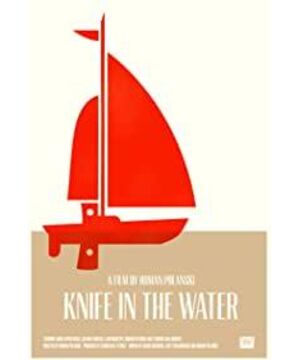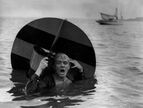Text/Gucheng When I look back on my distant past, the boundary between reality and imagination is always so disappointingly fuzzy and chaotic. ——Roman Polanski Some people say that Roman Polanski’s movies are always filled with bone-chilling coldness and solitude. His suffering childhood destroyed the original purity and flawlessness of this world. Some people say that his movies are full of obscurity and pessimism. His unique Jewish characteristics and experience and the tragic life experience of the concentration camp made him only bear the pain of life and feel the despicability of human nature. Some people say that he used to be a suspect of seduce young children, and his cold heart has been filled with hatred and madness after the more than one hundred knife marks left by his wife's eight-month pregnancy. Others say that he is a deep excavator of human nature, and he awakens people's thorough understanding of the world with a voice like a cry in a nightmare. His fierce and tense character burst out in [disgust] (Repulsion) with a disguise and cathartic appearance. Carlo's cold face and hollow eyes directly hit the panic and distorted society, her weird demeanor and isolated schizophrenia. It dissects the harm of the law of survival to the freedom of human nature and the influence on the dislocation of the human mental state. In the film, the remains of the rabbit, the rootless iron, the nightmare of carnal raging and the harsh noise render the effect of panic and horror and the sense of dislocation of the world. The hatred of the world and the trance of being in the world suddenly evolved into a kind of strangeness to the distant and empty world and the fear of invading the bone marrow. [Rosemary's baby] (Rosemary' s Baby) transplants and imposes this kind of mental condition on a baby without pupils. What hides under the calmness, kindness and hope is not the composition of "natural goodness", but the evil of subversion, hypocrisy and despair. An unstoppable fear, an elusive alienation, a disorder that is difficult to resolve during pregnancy, an unknown appearance of spatial dislocation, and the distant and dark pupils hidden behind everything, this may be more than creepy The intuitive feelings that it brings to people, and the deeper exploration of fate haunts the dim tone of the entire film. He seems to have fallen into a deeper abyss. His cowardly, escapist character used a reflection and questioning attitude to ignite the slight tremors in the male soul in [Cul-de-sac] (Cul-de-sac). Maybe a woman can rely on a man when he is helpless, but when a man is hesitant and lost, will he face isolation or evasion of responsibility? Perhaps these analyses of male weaknesses are his reflection on his life and career, but his inability to escape the tribulations of fate made him feel a little gloomy and resentful under his seemingly aloof appearance. This feeling is more sharply displayed in [The Pianist]. The performance of that silent music covers the escape and compromise of Mingzhe to protect himself, but it also contains the mind and courage to face the bleak life. The questions and reflections that were not answered in [Dead Island Cry] appeared implicit and vicissitudes after so many life journeys. Maybe [the pianist] is relived the painful experience of the concentration camp in the past, maybe it is complaining about the injustice and persecution of the self in this world, maybe it is just presenting an indelible history before us from a perspective, maybe It makes people’s loneliness and helplessness imprinted naked in our hearts, but it also ignites long-lost hopes in people’s hearts, and calmly tells us that there is still a trace of conscience and justice in this world with the mentality of an old man. His disappointed and lonely emotional world borrowed Hardy's novel [Tess] (Tess) and put it on the screen. Although the film sometimes flashes romantic love and innocent love, the strong tragic color and sense of fatalism still make the film fall into a desolate desolation. The eternal love will never find a place in Polanski’s movies. The burning love eventually burns two people into ashes. The attraction, possession, madness, abuse, boredom, betrayal, hatred, destruction and death of love are in That [Bitter Moon] (Bitter Moon) has been recorded and passed down like a swipe. Love in Polanski’s memory is painful repetition and unresolved bitterness. When the four-cornered love of the four people finally ended in death, some discordant ripples can't help but appear in everyone's heart. These ripples make the world the most The romantic and happiest lovers are also suddenly lost, and the warmest and most harmonious family is also suddenly lost. However, the style of Polanski’s later works is very different from his horrifying work [Noz w wodzie]. Although the film is still permeated with a pessimistic tone towards the world and life, although the film caters to his later works The gloomy tone of the work, but the calm and deep and calm onlookers undoubtedly make the later works lose the simplicity and innocence of art. Especially after his wife was accidentally killed in 1968, Polanski's works all fell into a situation of pessimism, helplessness and despair. When I was fortunate enough to watch such a relatively pure movie, the commotion in my heart was far more intense and surging than the impact of his later grandstanding "movie technique". However, this fierce and turbulent surging conflict with the implicit and introverted sharp conflict of the film itself, my heart is trapped in the escape and fear of the unknown world in the sometimes quiet and sometimes restless entanglement. Polanski once expressed this fierceness in his two short films ([Morderstwo] and [Rozbijemy Zabawe]), and in another short film [Two Men and the Closet] (Dwaj Ludzie Z Szafa) expresses this kind of introversion. However, in [Water Knife], the feelings he expresses are far more restrained than the former, and richer than the latter. [Sword in the water] It starts with the shadowy reflections of the tree branches on the car windows and the vague human faces, which heralds the complexity and contradiction of people's inner world in the chaotic world. This may be the unknown mystery and confusion we often say Be confused. When people are not confused, there is always some loss and some unfinished estrangement. This loss and estrangement is vividly reflected in the eyes and behavior of a middle-aged couple. Peaceful dialogue hides tit-for-tat conflict. The director did not let us tolerate this conflict too much. The appearance of a young guy broke up the mass disagreement in the air. However, his intervention did not alleviate the disagreement. The boredom of life revealed in his speech showed the direction of the film's future development and the fate of the characters. Maybe they can only get a little comfort in a few intervals, and this kind of comfort is short and suffocating. The young man is not rich, he once expressed his admiration and jealousy for the "magnificent" car after he got in the car. He and his wife are in two different classes. On the one hand, he hates the mental state of the couple’s appearance and separation. On the other hand, he yearns for this kind of easy life. The inner conflict is manifested when the couple invites him to sail together. . But the young man's confusion about the future is like a towering mast, seeming to break through the distance of the sky. Perhaps it was the curiosity of the unknown, or the desire of the man himself, the boy made an unfamiliar choice, through the vague ambiguity and the confusion of avoiding inferiority complex. The silhouettes of the three people were suddenly smeared with a dark tone by the pale sea water, which also heralded the transformation of the characters and the imbalance of the inner world in the future. Since then, the non-subjective perspective photography of the film has given the audience the pleasure of voyeurism. The camera is placed below the shoulders of the characters, inducing the audience's desire to explore the unknown, and have a glance at everything in life. This unique perspective of focusing on women is close to the perspective of the youth, and it also changes the perspectives of the audience and the youth in a sultry way. Therefore, in the subsequent lens language, we will be used to seeing women shuttle and wander through the lens. Of course, this kind of gaze does not only exist between the boy and the audience. Women will also sneak at the boy when they are bored. This provocative look is a secret word for appreciation in the eyes of the boy, which is far simpler and more flickering than kitsch. . The rein may be a key word in the film, and the interpretation that can be thought of positively has traction and control. This implication was easily borrowed by Polanski. The man holds the reins of the ship, and at the same time he leads the direction of the three people and controls the progress of the story. He lent the reins to the boy and made a mess Later, the husband and the youth showed the struggle between control and anti-control. It also hints at the weak status of the boy. The second thing the boy wanted to conquer was the mast that once confounded him. After he climbed the top of the mast, he refused lunch in a mocking tone, and the boy's Jedi counterattack began. The look that the woman expects and help him throw away the hot pot in his hand already implies that the status of men and youth has begun to move towards a balance, which makes men fearful. Conquering the ocean and conquering women have been men's constant means and methods for conquering the world since ancient times. Men and youth are chasing in different ways. Throwing oars and sailing aground is the result of mutual victory and defeat in the game between the two. Although the role of women in this game is self-evident, there is no doubt that women can no longer invest themselves on the side of the balance. The result of this game adds a heavy weight. Although the young man could not take the helm independently, he still tried it without authorization. In the rain, the sailboat hid in the reeds to avoid the rain, and the young man had begun to peep at the naked woman unconsciously. The change of his status and the decline of his fear made this behavior not so abrupt, and all developments have unknowingly entered the trap of the youth. In the cabin, three people play a game of clubs. The bets are women’s high heels and youth belts. We cannot superficially understand these as the relationship between men and women, and the metaphorical relationship between high heels and belts. Ambiguous, it actually represents the shift of power and the dislocation of characters. At this time, women and youth can already talk and laugh. The essence of the film is not the knife. From the time when the youth took out the knife, the existence of the knife was given an unusual role, but its meaning was limited to symbols. The conflict between the man and the youth broke out when the man threw the knife into the sea provocatively. The subsequent development was unexpected but unexpected. When he got up early in the morning, the man finally fell into the trap of the youth because of jealousy: Youth After being hit by her husband in the water, she hid behind a buoy on the surface of the water. The couple quarreled over this fight, and the husband was irritated by his wife to find the youth. Later, the young man returned to the boat, but by then the husband had already traveled far away. After a brief and hypocritical life discussion, the youth and his wife seem to have reached a consensus. After that, sensuality broke through the cage of reason. The proposition of "knife in the water" suddenly became clear at this moment. The knife that fell into the sea was actually just a cover, and the real knife was completed with a woman's betrayal. Cheating, this sensitive word happened smoothly in the film. Although the woman repented and admitted all this at the end, the man’s hypocrisy caused him to say something to the woman. suspect. This suspicion actually has two meanings: one is that the estrangement between husband and wife, the aggressiveness of the relationship between the characters, and the arrogant masculinity make it impossible for him to admit this betrayal, and the other is that men are trying to escape the police. The responsibility of the bureau to surrender the case would rather admit the existence of this betrayal on the surface. This self-contradictory contradiction made him stagnate at the crossroads of fate, and the film also ended with the strong flavor of jazz. Maybe we still don’t know where the husband will go? But this double-sidedness of self-deception (characters bear the dual status of deceiving themselves and being deceived) and the bitterness of reality and ideals split by the "water knives" will leave us intriguing gimmicks. [Sword in the water] did not make moral judgments and value measurement of anyone. The three characters in the film bear various responsibilities. Polanski did not directly determine the conflict between responsibility and responsibility. He gave the scale to the audience, while hiding behind the camera and scrutinizing the world. His calmness and keenness will not lose its brilliance because of plainness, but will stand out after years of research and experience recognition. Perhaps Polanski’s subsequent films have not been able to reconstitute such a flat-story film, but this method of establishing the tension of the characters’ drama, this way of portraying the inner world of the characters and exposing the dark side of human nature is still vividly reserved and Passed down. At the same time, Polanski has inherited Polanski's attainments and inspiration in artistic comprehension to a certain extent. Another point worth mentioning is that the metaphors abound in the film make the film more worthy of in-depth aftertaste and exploration. The philosophical and conceptual control of the film's context and rhythm also created the obscure artistic tone of his later works. Philosophical speculation and psychoanalysis have since become the indispensable main axis in Polanski's films. They continue to touch the psychological defense of human beings and provide a lasting reference and influence in the process of human beings exploring the proposition of human nature. 04/10/08 1:51 Originally published in "Movie World"
View more about Knife in the Water reviews







